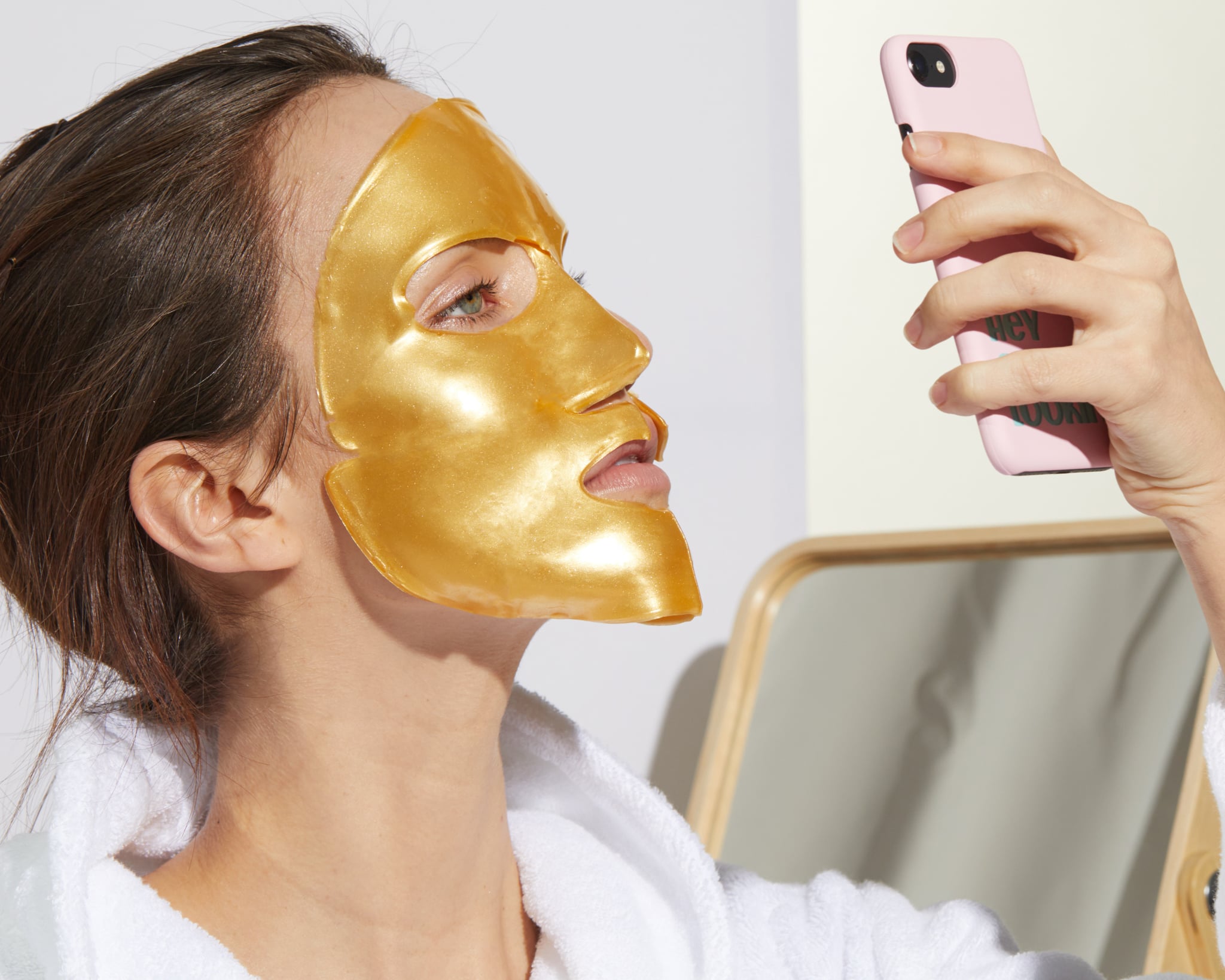
Right now on TikTok, instead of obsessing over a new drugstore product [1], dance craze, or beauty hack [2], people are analysing how "imperfect" their faces are [3], and it's all thanks to the viral inverted filter [4].
The filter, which flips your appearance to show your mirrored reflection — or how you look to other people — now has over 316 million views on the hashtag, with thousands of videos from users trying it out to varied reactions. Some people are pleasantly surprised by their facial symmetry, while others are shocked by how different their appearance is when they toggle the filter on and off. "I cried on my couch for hours after using this filter," one user wrote. Another, "Now I know why no one things I'm pretty."
Even though doctors claim it's nearly impossible to have perfect facial symmetry, the inverted filter on TikTok seems to be taking a toll on people's self-confidence [5] and their mental health [6]. Ahead four experts break down why that is.
How the Inverted Filter Works
While the inverted filter is not changing your appearance in any way, it is playing with your perception of self, simply by showing you it in a way that you don't usually get to see.
"What everyone else sees when they look at you is the opposite of what you see reflected back at you in the mirror," Azza Halim [7], MD, a board-certified anesthesiologist, aesthetics, functional medicine physician based in Florida, told POPSUGAR. "When you look at yourself in a mirror, you see a 'mirrored image' so in your eyes that's the normal appearance you expect others to see."
Because the inverted filter shows you your face in a new way, it can magnify features you wouldn't normally notice or cause you to spot the smallest of differences. "All of a sudden you might notice that one eye might be a little higher, a little bigger, or one corner of the mouth is slightly higher — when digitally enhanced, those things can be troublesome," said Konstantin Vasyukevich [8], MD, a board-certified facial plastic surgeon based in New York City.
The Myth of a Symmetrical Face
How common is a symmetrical face anyway? Not very — but the idea that symmetry equates to "beautiful" is based on a centuries-old theory better known as the Golden Ratio. "It was previously thought that if the face is perfectly symmetrical — length one and half times the width, approximately — that is a sign of beauty," said Dr. Halim. "Everyone has coveted that perfect model-symmetry and flocked to many procedures, surgical and non-surgical, invasive and non-invasive, to try to get correct any asymmetry. Now that being said, the golden ratio is not the end all, be all in aesthetics."
These days, according to Dr. Vasyukevich, in the medical community as long as the difference between both sides of your face is less than 15 percent, it's imperceivable to the naked eye. It's only when that asymmetry is more than a 15 perfect difference will plastic surgeons or dermatologists suggest using fillers, fat grafting, or other medical corrective procedures to fix the discrepancy.
"I see patients like that all the time whose one cheek is fuller than the other cheek, or there's a difference between the eyes and the lips — those things are perfectly correctable," said Dr. Vasyukevich. "This is when it can be a good thing that somebody recognises their face is asymmetrical and it's noticeable."
With TikTok filters, that's not always the case, but it's important to remember in our daily lives "we don't experience faces in their static state," said Josie Howard, MD, board-certified psychiatrist with expertise in psychodermatology. She compared it to hearing your own voice on a recorded message — something that many people also recoil at. "It's one part of you that has been extracted and isolated, and it's distorted by being taken out of context."
How the Inverted Filter Can Be Dangerous For Your Mental Health
Beauty filters, much like Photoshop, FaceTune, and other image-altering software, contribute to unrealistic beauty standards [9] and take a toll on young people's self-esteem.
"Many people have described feelings of inadequacy as they compare themselves with all the photoshopped, filtered, and curated images," said Dr. Halim. "This inverted filter trend has created, for many people, anxiety as to how asymmetric their faces appear." More than that, it can contribute to body dysmorphia, where Dr. Howard said people "become consumed by minor or perceived physical faults that then affect and spill over into how they are functioning in other areas of their lives."
When you get used to seeing yourself one way, all of a sudden having your perception change can be very disorienting. As people, we find comfort in familiarity. "Seeing something different than how we see ourselves can create discomfort," Ben Lee, MD, a board-certified plastic surgeon and leading expert in anti-ageing surgeries at WAVE Plastic Surgery Centre [10]. "There is actually a study that showed that women perceive their mirror image as more attractive than their inverted image."
This filter is also popping up during a time of increased stress and loneliness when many young people are already reporting a dip in their self-confidence. "It's exploiting our increased sense of isolation and with that, a shift in emphasis from in-person human connection to virtual forms of communication," said Dr. Howard.
It's important to remember that nothing is as perfect as it seems on social media — not someone's "symmetrical face," or their relationship, or their job. "Everything we see on social media is perfect by design," said Dr. Lee. "None of us can compete with this idealised version of reality. We would all do better to keep in mind that augmented reality isn't all that real."